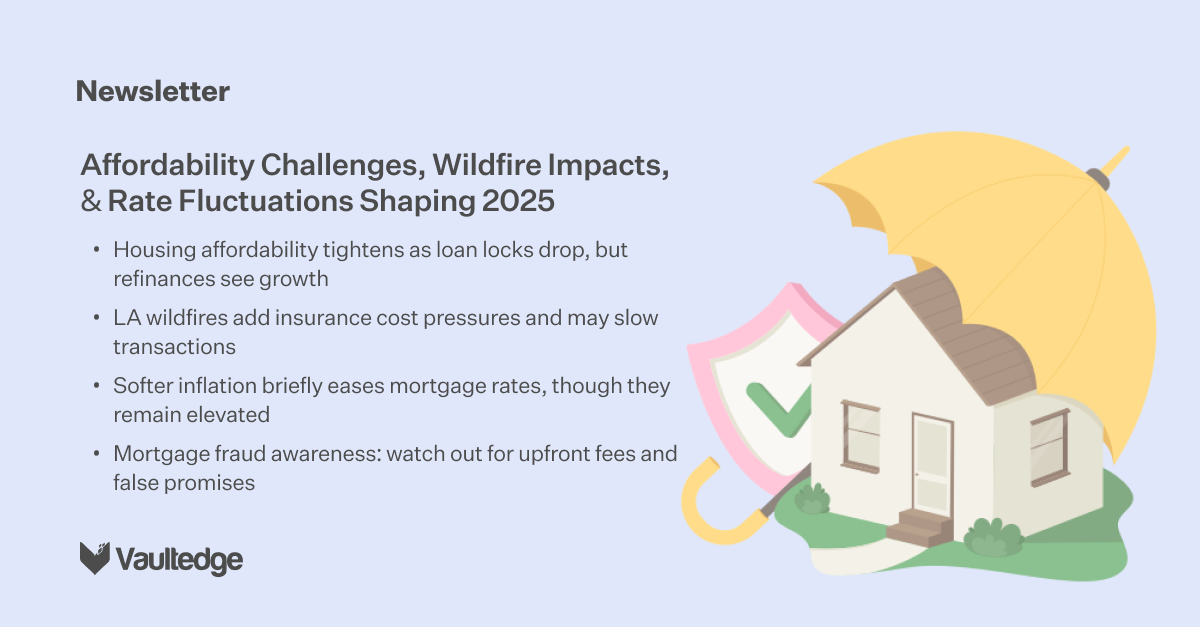Mortgage Market Insights on Affordability Challenges Wildfire Impacts and Rate Fluctuations Shaping the 2025 Outlook for Borrowers and Lenders
A weekly round-up of key trends in mortgage market conditions and affordability challenges, and rate fluctuations for 2025.
What's Included:
Mortgage market struggles with affordability, declining loan locks, and high borrowing costs, though refinances see growth.
LA wildfires could disrupt the market by raising insurance costs, delaying transactions, and impacting homebuyer sentiment.
Mortgage rates ease after softer inflation data, offering temporary relief but remaining elevated.
Professionals are encouraged to educate borrowers on spotting mortgage fraud, especially upfront fees and false promises.
Here’s a complete low-down 👇
Before you move on …
We would love, if you could subscribe to our newsletter.
Affordability Challenges and Volatile Rates Shape a Slow Start for 2025 Mortgage Market
The mortgage industry began 2025 under significant strain, marked by volatile rates and a challenging affordability environment. Mortgage rate locks fell 16.7% in December, continuing a downward trend despite a modest rise in rate-and-term refinance activity. Purchase loan locks declined nearly 20%, illustrating the struggles faced by buyers amid elevated borrowing costs. The broader picture reveals subdued activity, with normalization still elusive for the market.
Yet, year-over-year figures provide a glimmer of optimism. December saw a 22% rise in purchase loan locks and an impressive 104% increase in rate-and-term refinances compared to 2023, per Mortgage Capital Trading. Andrew Rhodes, Senior Director at MCT, highlighted how strong labor data and cooling inflation suggest the Federal Reserve might delay rate cuts, prolonging high financing costs. The 256,000 jobs added in December exceeded forecasts, complicating affordability challenges for borrowers navigating elevated rates.
Looking ahead, affordability pressures remain the dominant force sidelining buyers. Volatile rates above 7%, surging property taxes, and escalating homeowners insurance premiums weigh heavily on prospective borrowers. As policymakers balance inflation control with economic stability, the market awaits clarity on administrative policy changes and their implications for affordability and accessibility….Read More.
How LA Wildfires Could Disrupt Mortgage Markets by Increasing Insurance Costs and Slowing Transactions
The recent wildfires in Los Angeles are expected to disrupt mortgage trades in several ways. The immediate impact is on the timing of deals, with additional diligence required to ensure properties are still intact. This slower pace could lead to higher costs, possibly increasing interest rates on trades.
Moreover, the aftermath of wildfires could affect homebuyer sentiment. Areas prone to such disasters may see reduced demand due to potential property damage and escalating homeowners’ insurance premiums. This, in turn, could affect mortgage costs and borrower qualifications.
In the long term, increased premiums and stricter insurance requirements may raise mortgage payments and debt-to-income ratios. While this might not cause dramatic shifts in the secondary market, it could lead to a slight increase in mortgage pricing as lenders factor in the added risks of these areas…. Read More.
Mortgage Rates Drop Back to Last Week's Levels After Softer Inflation Data Brings Relief
Mortgage rates have dropped back to last week’s levels following a softer-than-expected Consumer Price Index (CPI) report. The CPI, a key measure of inflation, was highly anticipated due to its potential to influence financial markets. When inflation data deviates from forecasts, it often triggers significant shifts in bond markets, which directly impact mortgage rates. Today’s report provided a welcome reprieve for borrowers as rates fell after hitting their highest levels in eight months earlier this week.
The market reaction underscores the close relationship between inflation trends and interest rates. Softer inflation data signals reduced pressure on the Federal Reserve to maintain aggressive monetary policies, which bond traders quickly responded to by driving yields lower. This marked one of the most significant daily rate drops in months, illustrating a pattern where long-term rate peaks are often followed by sharp declines when favorable economic data emerges.
While this drop offers relief, rates remain elevated compared to historical standards. Future trends will hinge on upcoming economic reports to determine whether the decline gains momentum or stalls. For now, this shift provides a hopeful starting point for borrowers and a reminder of the dynamic interplay between economic data and mortgage markets… Read More.
How Mortgage Professionals Can Help Borrowers Recognize and Avoid Mortgage Fraud
Mortgage fraud is a growing concern, with scams targeting vulnerable borrowers through false promises and deceptive tactics. To help borrowers stay safe, mortgage professionals must educate clients about the risks and red flags. One major warning sign is an upfront fee for services. Legitimate lenders or relief programs never ask for payment before delivering results. Borrowers should also be cautious of claims of guaranteed approval or affiliations with government agencies unless verified.
Another critical red flag is being instructed not to communicate with their lender or an attorney. Scammers often discourage external consultation to prevent borrowers from uncovering the fraud. Professionals can guide borrowers to seek help directly from their loan servicers, HUD-approved counselors, or legitimate nonprofit organizations. Any communication suggesting exclusive success rates or special contacts for loan modifications should be scrutinized.
Borrowers should also verify all documents and seek advice if anything seems suspicious. Mortgage professionals can encourage their clients to review forms carefully, especially for omitted warnings about foreclosure rescue scams. By staying proactive and vigilant, professionals can help borrowers avoid falling victim to scams and protect their financial well-being. Empowered borrowers make for a safer, more transparent mortgage ecosystem…. Read More.
This wraps up our issue for the week.
We've covered the latest developments in the housing market this week. Keep informed with our expert analysis and industry insights. Subscribe now to stay ahead and delve deeper into these topics and more in our newsletter.




